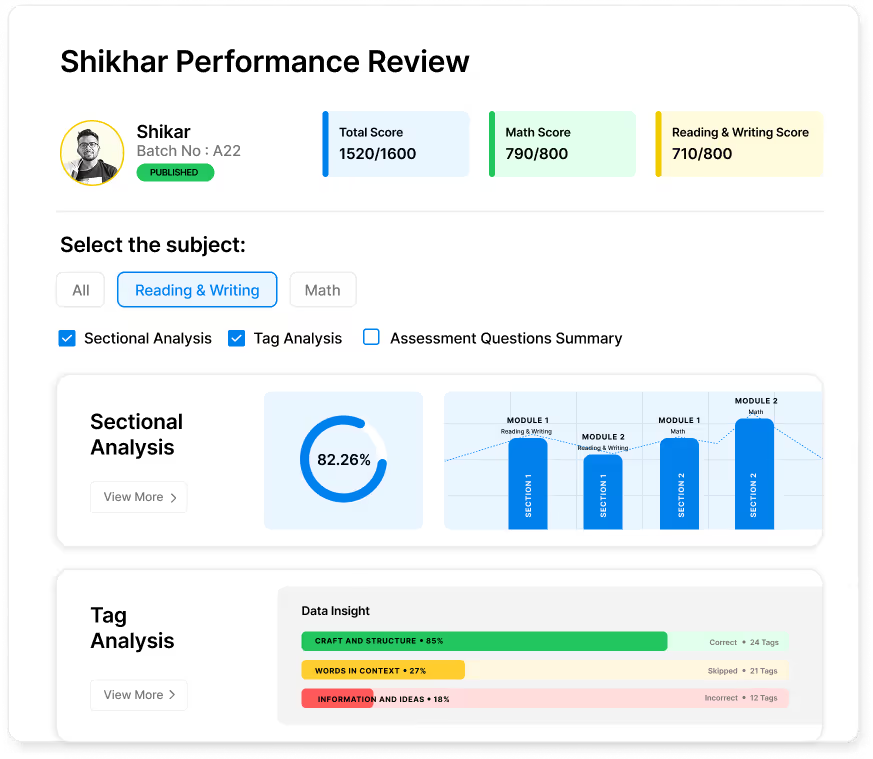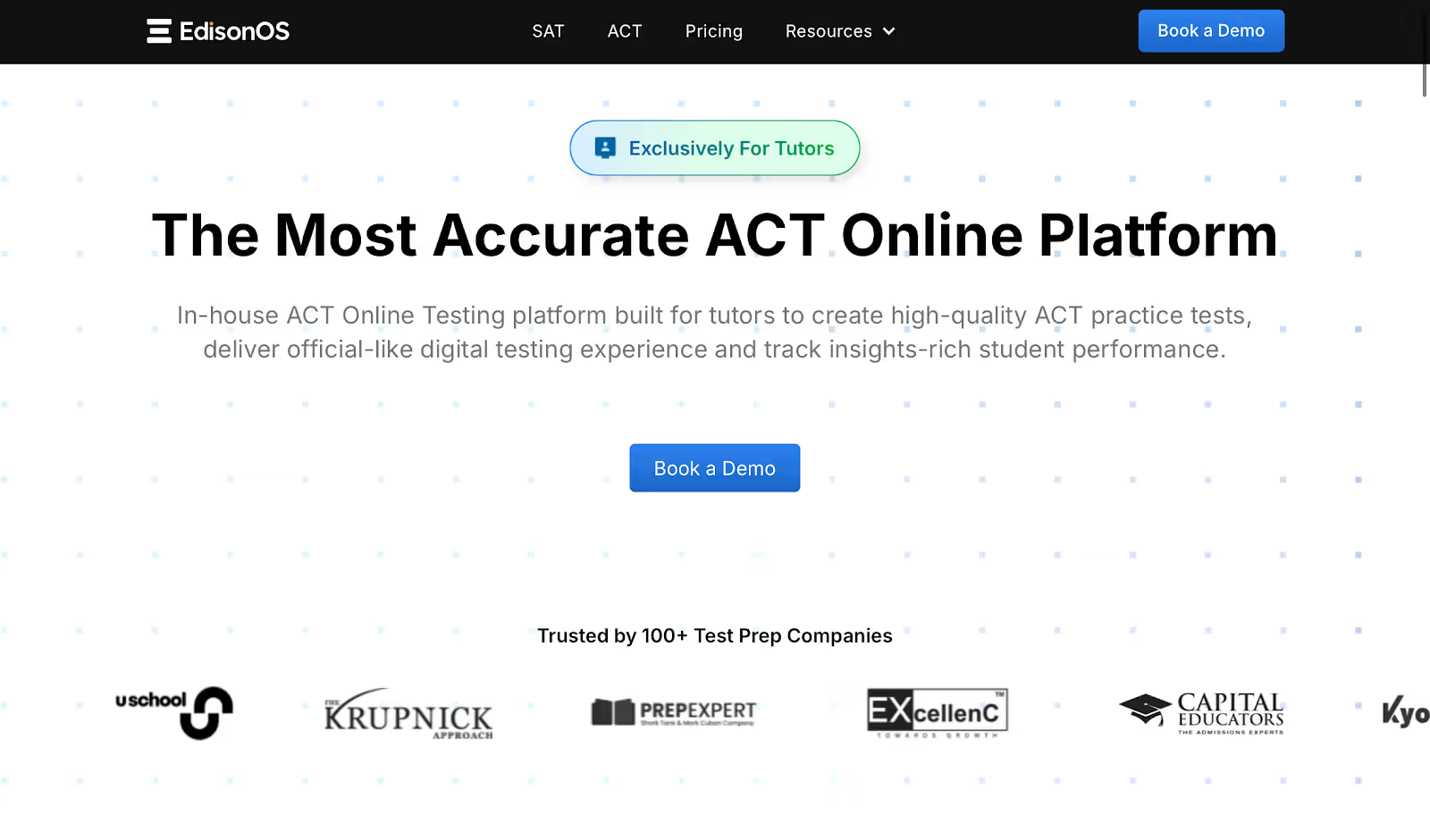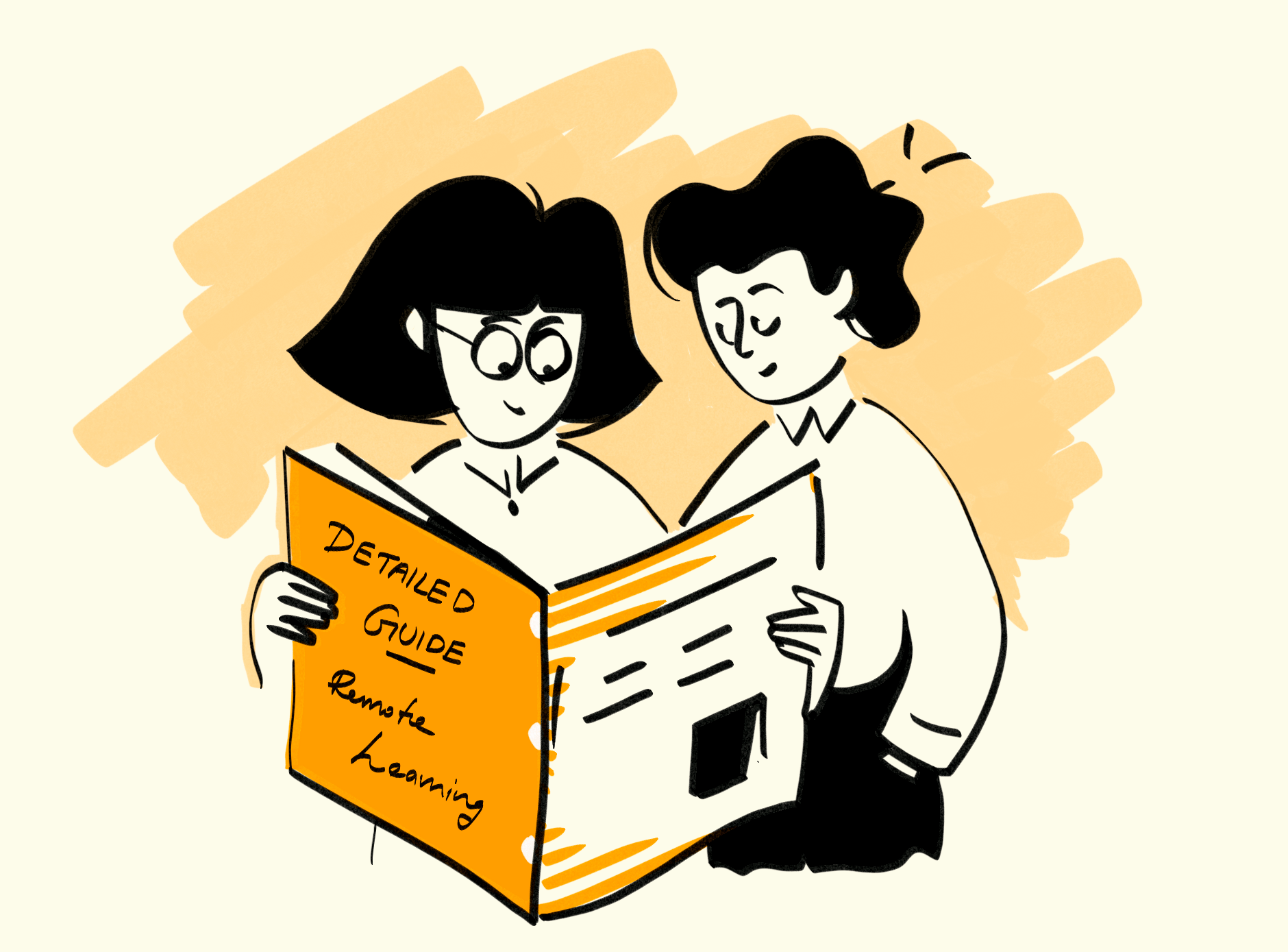




Key Takeaways
- ACT success depends on both mindset and smart, consistent test strategies.
- Timed practice builds confidence and improves pacing for digital ACT format.
- Strategic guessing and anxiety control can significantly boost test-day performance.
Taking the ACT is a major milestone for many high school students, often representing much more than just a three-hour test. It is a key that can open doors to dream colleges, scholarships, and even future career opportunities.
Yet, due to the high stakes involved, many students find themselves overwhelmed, second-guessing their strategies or burning out just weeks before test day.
This is where ACT tutors and educators like you play a crucial role. Besides teaching, you can help students shape theIr mindset and learn techniques to improve their performance.
In this article, we explore actionable tips and strategies that you can incorporate into your ACT tutoring sessions to help students approach the ACT with confidence.
Why ACT Test Tips Matter for Student Success
Students preparing for the ACT are dealing with a lot more than academic challenges. They must navigate time pressures, manage nerves, and maintain focus across several rigorous sections.
Sharing effective strategies provides students with a framework they can rely on during the ACT. Test-day performance is as much about mindset and technique as it is about knowledge.
Customize your practice sessions, give detailed feedback, and simulate the experience with digital ACT testing platforms like EdisonOS to give your students every possible advantage.

Combining practice with strategy boosts student outcomes significantly, especially as the ACT has moved to a digital ACT format.
6 ACT Test Tips Every Student Should Know
Before focusing on individual sections, it is important that students understand some universal principles. These foundational ACT tips from tutors can significantly improve overall performance.
1. Manage time strategically
Since the test is fast-paced, learning ACT time management tips influences a student’s score. Encourage students to time themselves so that it does not create unnecessary stress on test day.
If they find themselves stuck at a question for more than 30 seconds, they should make an educated guess and move forward. Encourage them to allocate time strategically by section. If a Reading passage has 10 questions and they have 8 minutes left until the test ends, that is less than a minute per question.
Regular timed practice with free ACT online practice tests will help them build an internal "test clock" that feels natural on the big day.
2. Eliminate, then guess
Since there is no penalty for wrong answers, students should never leave questions unanswered. Teach them how to eliminate clearly incorrect options to increase the odds of guessing correctly.
If they are running out of time, students should pick a "letter combination of the day" (like A/B or C/D) and follow it to fill in the remaining answer bubbles. They’re more likely to pick up points by being consistent in this manner.
Random guessing causes loss of points, whereas strategic guessing can save them.
3. Address test anxiety early
Pre-test anxiety is real and it affects even the best-prepared students. Make sure the students are familiar with the ACT scoring chart to have a close idea of how their performance will be judged.

Encourage students to simulate testing conditions during practice and introduce simple techniques like deep breathing and positive self-talk. Breathing exercises sound cliché until you actually use them.
Introduce mindfulness exercises like deep breathing or visualization techniques during practice sessions. Something as simple as a three-minute calming routine before starting can significantly lower stress levels and boost focus when it matters most.
4. Prioritize sleep and nutrition
Academic preparation must be paired with personal readiness. Emphasize the importance of adequate sleep for at least a week before the test, not just the night before. A balanced breakfast high in protein and low on sugar on test day can also support better concentration and stamina.
5. Mark-and-move strategy
Encourage students to mark tough questions on the test booklet and move on to the next one instead of wasting time trying to solve them. Later, they can return to it after answering the easier questions.
6. Batch bubbling
Bubbling answers is time-consuming if done parallely with solving the questions.
Rather than filling the bubbles on the answer sheet after each question, students should answer a page’s worth of questions first, mark the answers on the test booklet, and then transfer the answers in batches onto the answer sheet.
This reduces the back-and-forth motion and helps maintain test momentum.
Section-Wise ACT Tips for Students
Each section of the ACT has its own format and challenges. Providing students with unique strategies for each section can greatly enhance their readiness.
English Section: Focus on Rules and Precision
The English section tests students' grasp of grammar, punctuation, and sentence structure. It rewards precision and adherence to standard English conventions.
- Choose the most concise option: When in doubt, the shortest grammatically correct answer is often the best. Teach students to spot and avoid redundancy and wordiness.
- Master key grammar rules: Students should be well-versed with common ACT-tested grammar rules such as subject-verb agreement, parallel structure, and comma usage.
- Trust rules, not instincts: Encourage students to base their choices on learned grammar principles rather than on what "sounds right." Regular exposure to official ACT questions helps reinforce this habit.
Practicing with real ACT materials allows students to recognize patterns and become more efficient in identifying errors.
Math Section: Balance Speed and Accuracy
The Math section covers six question types: pre-algebra, elementary algebra, intermediate algebra, trigonometry, plane geometry, and coordinate geometry. Students have 60 minutes to complete 60 questions, and therefore need to be able to perform quick, accurate calculations.
- Memorize core formulas: Students should be familiar with essential formulas because they are not provided on the test, such as those for area, volume, and basic trigonometric functions.
- Triage questions: Advise students to work through easier questions first and return to more challenging ones if time allows.
- Be wary of trap answers: Often, the ACT includes answer choices that reflect common calculation mistakes. Remind students to review their steps, particularly when a problem seems unusually straightforward. Also, watch out for sneaky "NOT" or "EXCEPT" phrasing.
Integrating platforms like EdisonOS into practice sessions can help students identify patterns in mistakes and track their pacing for ongoing improvement.
Reading Section: Build a Strategic Approach
The reading section demands fast comprehension and the ability to extract information efficiently under time pressure. There are four ACT reading passages of approximately 800 words each in this order:
- Prose fiction
- Social science
- Humanities
- Natural science
For each passage, students have to answer 10 questions that test both what is directly stated as well as what is implied. Thus, they have to answer 40 questions in 35 minutes.
- Skim for structure: Students should focus on understanding the organization and tone of the passage rather than memorizing every detail.
- Prioritize line-referenced questions: Questions that direct students to specific lines should be addressed first as they require less inference and reduce the time spent rereading the entire passage.
- Identify the author’s purpose and tone: Many questions hinge on the author's tone or purpose. Training students to recognize these elements quickly can yield significant score gains.
Consistent timed practice is key to building the endurance and reading speed necessary for success in this section.
Science Section: Focus on Data Interpretation
The ACT Science section tends to intimidate students, but it primarily tests reading and interpretation skills rather than advanced scientific knowledge. Students have 35 minutes to answer 40 questions after reading 7 passages.
- Skim visuals first: Encourage students to examine graphs, charts, and headings before diving into textual explanations.
- Rely on presented data: Remind students that the correct answers are based on the data given, not on prior knowledge or assumptions.
- Underline key terms: When reading questions, students should underline specific instructions such as "according to experiment 2" to stay focused and avoid unnecessary rereading.
Using practice tests or digital platforms that mimic the ACT’s format helps students become comfortable interpreting complex visuals under timed conditions.
Learn more: The 7 Common ACT Mistakes & How to Avoid Them
Last-Minute ACT Preparation Strategies
In the final days before the ACT, strategic preparation is far more effective than last-minute cramming. At this stage, the focus should shift from intense study sessions to preserving mental sharpness, organizing logistics, and reinforcing confidence.
The night before the test:
- Pack everything in advance: Students should double-check that they have their admission ticket, a valid photo ID, an approved calculator with fresh batteries, multiple No. 2 pencils (not mechanical), a small snack, and a water bottle. Packing everything the night before avoids the morning scramble and reduces unnecessary stress.
- Light review only: Instead of heavy studying, students should spend 20–30 minutes reviewing a summary sheet of key formulas, grammar rules, pacing tips, or last-minute reminders. Such light reinforcement builds confidence without overwhelming their mind.
- Prioritize rest: Advise students to shut down screens at least an hour before bedtime, keep their phone away from the bed, and aim for at least 7–8 hours of good sleep. A tired brain processes information more slowly, which can hurt even the best-prepared students.
On test day:
- Eat a familiar, balanced breakfast: A meal that combines protein, healthy fats, and complex carbohydrates is ideal. Eggs and bread, daliya, or a vegetable sandwich are recommended. Students should avoid food items that are too heavy, greasy, or completely new, as digestive discomfort can become a major distraction.
- Arrive early: Encourage students to plan to arrive at the test center at least 30 minutes early. Factoring in possible delays, such as traffic or unexpected check-in lines, helps ensure they stay calm and focused.
- Mental reset between sections: Quick mental resets between the ACT sections is powerful. Remind students to close their eyes for a few seconds, take slow deep breaths, roll their shoulders, or stretch their legs (if allowed). These small moments of relaxation refresh focus and prevent mental fatigue from snowballing.
During the exam:
- Use pacing strategies: Students should stay conscious of their pacing without obsessively checking the clock. If they notice they are falling behind slightly, they should speed up gently but avoid panicked rushing, which leads to mistakes.
- Smart guessing: If time is running short or a question seems unusually complex, students must remember that there’s no penalty for guessing. Making educated guesses, or defaulting to a predetermined letter for random guesses is far better than leaving answers blank.
- Stay calm and methodical: Remind students that slight bumps during the test, such as struggling with one difficult passage or a confusing math problem, are normal. Encourage them to shake it off, refocus, and approach each new question with a clear, steady mindset. A single tough question should never derail the rest of the test.
The Bottom Line
Effective ACT preparation is about more than content review; it is about giving students a set of reliable strategies they can apply under pressure. By incorporating clear, practical tips into your tutoring sessions, you provide students with a critical advantage: the ability to manage time, remain focused, and perform confidently on test day.

Tailor these strategies to meet the individual needs of your students, adjusting for their strengths and weaknesses. Additionally, leveraging advanced ACT preparation platforms like EdisonOS can support your efforts by offering targeted practice and detailed feedback.
Book a demo with EdisonOS here.
Frequently asked questions
Focus on review, not new learning. At the last minute, students should concentrate on refreshing key formulas, skimming grammar rules, and practicing timing with a few short drills. Trying to cram new topics can cause unnecessary stress and confusion.
Practicing under real-life timed conditions is the best. Tutors can also create pacing charts for students (e.g., "You should be on Question 30 by Minute 45") and encourage "mark and move" habits during mock tests to sharpen instincts.
Yes, strategies, such as bubbling efficiently, managing nerves, or knowing when to guess, can easily add 2–5 points to a student's score. For students on the borderline of their target, these gains are crucial.
Students should study lightly the day before the ACT. They should focus on review, organizing materials, and mental relaxation. Heavy studying often leads to burnout. It is better to stay sharp and rested than be overloaded with new information.
Tutors Edge by EdisonOS
in our newsletter, curated to help tutors stay ahead!
Tutors Edge by EdisonOS
Get Exclusive test insights and updates in our newsletter, curated to help tutors stay ahead!
Recommended Reads
Recommended Podcasts






.png)




.png)
.webp)
